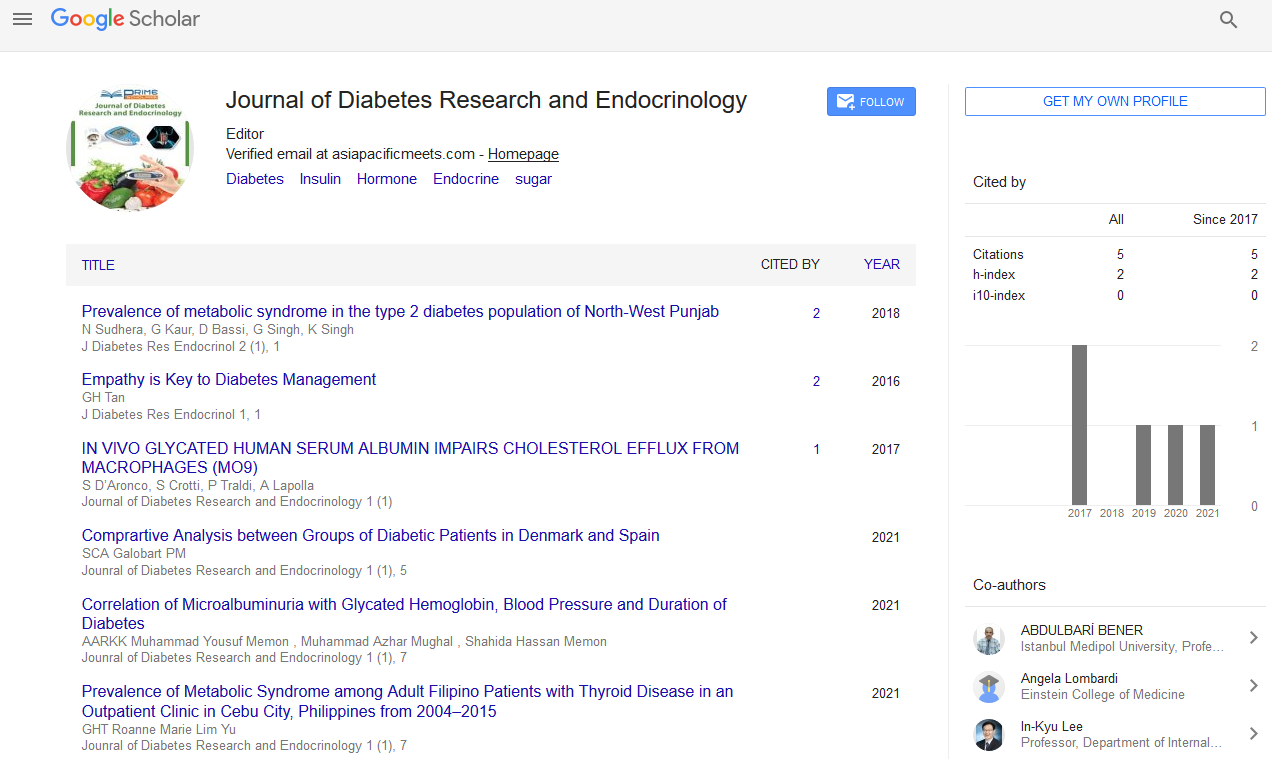Short Communication - (2023) Volume 7, Issue 2
Diabetes of any Kind is Treated in the Same Way that People with Disabilities
Cuneyd Anil*
Department of Surgery, The University of Chicago Medicine, United States
*Correspondence:
Cuneyd Anil,
Department of Surgery, The University of Chicago Medicine,
United States,
Email:
Received: 31-May-2023, Manuscript No. IPJDRE-23-16900;
Editor assigned: 02-Jun-2023, Pre QC No. IPJDRE-23-16900;
Reviewed: 16-Jun-2023, QC No. IPJDRE-23-16900;
Revised: 21-Jun-2023, Manuscript No. IPJDRE-23-16900;
Published:
28-Jun-2023, DOI: 10.36648/ipjdre.7.2.12
Introduction
An emotional state known as diabetes distress is characterized
by feelings of stress, guilt, or denial brought on by the burden
of managing one’s diabetes on one’s own. Diabetes distress
has also been linked to adverse health outcomes. One way that
slump and diabetes inconvenience are different is that diabetes
inconvenience isn’t viewed as a broken way of behaving.
The emotional reaction to living with diabetes, a life-threatening
condition that requires constant, demanding self-management,
is referred to as “diabetes distress” by researchers.
Significant emotional responses to the diagnosis, the threat
of complications, the demands of self-management, and the
unsupportive social structures surrounding diabetes are all
referred to as “diabetes distress.” People with diabetes of any
kind are treated the same as people with disabilities under the
Americans with Disabilities Act [1,2].
Description
This includes having access to public facilities like workplaces
and schools, as well as some benefits like Social Security and
disability insurance. Stress is normal when you have diabetes,
particularly when you’re simply getting everything rolling. It
tends to be hard to give close consideration to what you eat
and to recall a great deal of new data. It could mean that you
need to inject yourself on a daily basis or that you need to check
your blood sugar levels frequently. Diabetics are two to three
times more likely than non-diabetics to experience depression.
Diagnosis and treatment for diabetic depression affect only
25% to 50% of patients. Nonetheless, treatment-treatment,
medicine, or both is habitually exceptionally fruitful. Additionally,
without treatment, depression frequently worsens rather
than improves. The longer you have diabetes and the less
tightly your blood sugar is controlled, the more likely it is that
complications will occur. Diabetes complications have the potential
to eventually lead to disability or even death. If you’ve
been proactively analyzed, anyone who is under stress faces an
increased risk of developing type 2 diabetes or seeing changes
in your diabetes. Blood sugar levels can be affected by physical
and emotional stress, which can either exacerbate or cause diabetes.
It can show up as tiredness, frequent urination, and a
lot of thirst. Additionally, it may increase your risk of developing
nerve, heart, and eye problems. A condition can influence
your everyday existence until the end of your life. You might
need to make some changes to your diet, take some medicine,
and go to the doctor on a regular basis. Stress is caused
by severe, prolonged, or both forms of stress. It is feasible to
recognize the ideas of government assistance and stress and
trouble because of the way that a versatile and valuable pressure
reaction might occur amidst a short pessimistic close to
home state. Poor sleeping habits, including difficulty falling and
staying asleep, are frequently caused by diabetes [3,4].
Conclusion
Some diabetics sleep too much while others struggle to get
enough sleep. Diabetes and sleep are inseparable, and many
people with type 2 diabetes suffer from insomnia or poor
quality sleep. Fortunately, careful consideration of diet, exercise,
and glucose levels can significantly improve rest quality
and overall well-being. Diabetes is associated with anxiety disorders
and elevated anxiety symptoms. Tension and diabetes
seem to have a bidirectional relationship, as indicated by the
proof.
Acknowledgement
None.
Conflict Of Interest
The authors declare that they have no conflict of interest.
References
- Marchasson IB, Dubroca B, Manciet G, Decamps A (1997) Prevalence of diabetes and effect on quality of life in older French living in the community: The PAQUID Epidemiological Survey. J Am Geriatr Soc. 45(3):295-301.
[Crossref] [Google Scholar] [PubMed]
- Liu SY, Trope GE, Buys YM, Defrawy SR (2020) Visual impairment and the Ontario Disability Support Program. Metabolism. 115:154456.
[Crossref] [Google Scholar] [PubMed]
- Hoy D, Roth A, Viney K, Souares Y (2014) Findings and implications of the Global Burden of Disease 2010 Study for the Pacific Islands. Prev Chronic Dis. 11:E75.
[Crossref] [Google Scholar] [PubMed]
- Kulmala J, Era P, Parssinen O, Sakari R, (2008) Lowered vision as a risk factor for injurious accidents in older people. Aging Clin Exp Res. 20(1):25-30.
[Crossref] [Google Scholar] [PubMed]
Citation: Anil C (2023) Diabetes of any Kind is Treated in the Same Way that People with Disabilities. J Diab Res Endocrinol. 7:12.
Copyright: ©2023 Anil C. This is an open-access article distributed under the terms of the Creative Commons Attribution License, which permits unrestricted use, distribution, and reproduction in any medium, provided the original author and source are credited.

